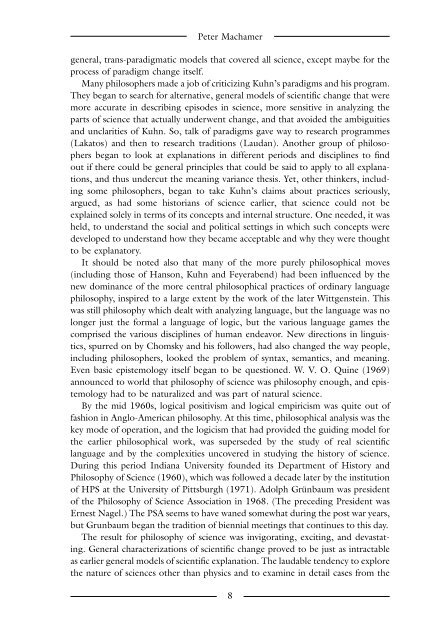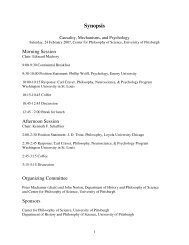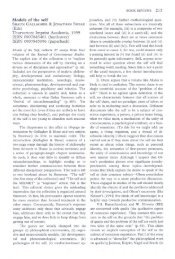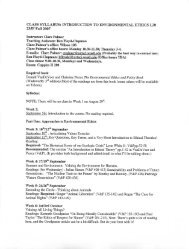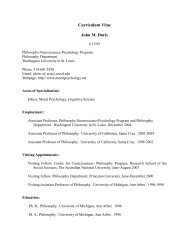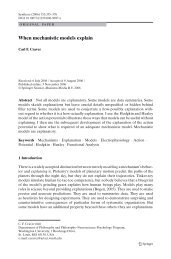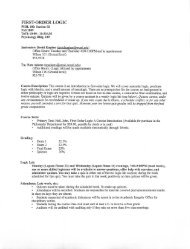The Blackwell Guide to the Philosophy of Science - The Department ...
The Blackwell Guide to the Philosophy of Science - The Department ...
The Blackwell Guide to the Philosophy of Science - The Department ...
Create successful ePaper yourself
Turn your PDF publications into a flip-book with our unique Google optimized e-Paper software.
Peter Machamer<br />
general, trans-paradigmatic models that covered all science, except maybe for <strong>the</strong><br />
process <strong>of</strong> paradigm change itself.<br />
Many philosophers made a job <strong>of</strong> criticizing Kuhn’s paradigms and his program.<br />
<strong>The</strong>y began <strong>to</strong> search for alternative, general models <strong>of</strong> scientific change that were<br />
more accurate in describing episodes in science, more sensitive in analyzing <strong>the</strong><br />
parts <strong>of</strong> science that actually underwent change, and that avoided <strong>the</strong> ambiguities<br />
and unclarities <strong>of</strong> Kuhn. So, talk <strong>of</strong> paradigms gave way <strong>to</strong> research programmes<br />
(Laka<strong>to</strong>s) and <strong>the</strong>n <strong>to</strong> research traditions (Laudan). Ano<strong>the</strong>r group <strong>of</strong> philosophers<br />
began <strong>to</strong> look at explanations in different periods and disciplines <strong>to</strong> find<br />
out if <strong>the</strong>re could be general principles that could be said <strong>to</strong> apply <strong>to</strong> all explanations,<br />
and thus undercut <strong>the</strong> meaning variance <strong>the</strong>sis. Yet, o<strong>the</strong>r thinkers, including<br />
some philosophers, began <strong>to</strong> take Kuhn’s claims about practices seriously,<br />
argued, as had some his<strong>to</strong>rians <strong>of</strong> science earlier, that science could not be<br />
explained solely in terms <strong>of</strong> its concepts and internal structure. One needed, it was<br />
held, <strong>to</strong> understand <strong>the</strong> social and political settings in which such concepts were<br />
developed <strong>to</strong> understand how <strong>the</strong>y became acceptable and why <strong>the</strong>y were thought<br />
<strong>to</strong> be explana<strong>to</strong>ry.<br />
It should be noted also that many <strong>of</strong> <strong>the</strong> more purely philosophical moves<br />
(including those <strong>of</strong> Hanson, Kuhn and Feyerabend) had been influenced by <strong>the</strong><br />
new dominance <strong>of</strong> <strong>the</strong> more central philosophical practices <strong>of</strong> ordinary language<br />
philosophy, inspired <strong>to</strong> a large extent by <strong>the</strong> work <strong>of</strong> <strong>the</strong> later Wittgenstein. This<br />
was still philosophy which dealt with analyzing language, but <strong>the</strong> language was no<br />
longer just <strong>the</strong> formal a language <strong>of</strong> logic, but <strong>the</strong> various language games <strong>the</strong><br />
comprised <strong>the</strong> various disciplines <strong>of</strong> human endeavor. New directions in linguistics,<br />
spurred on by Chomsky and his followers, had also changed <strong>the</strong> way people,<br />
including philosophers, looked <strong>the</strong> problem <strong>of</strong> syntax, semantics, and meaning.<br />
Even basic epistemology itself began <strong>to</strong> be questioned. W. V. O. Quine (1969)<br />
announced <strong>to</strong> world that philosophy <strong>of</strong> science was philosophy enough, and epistemology<br />
had <strong>to</strong> be naturalized and was part <strong>of</strong> natural science.<br />
By <strong>the</strong> mid 1960s, logical positivism and logical empiricism was quite out <strong>of</strong><br />
fashion in Anglo-American philosophy. At this time, philosophical analysis was <strong>the</strong><br />
key mode <strong>of</strong> operation, and <strong>the</strong> logicism that had provided <strong>the</strong> guiding model for<br />
<strong>the</strong> earlier philosophical work, was superseded by <strong>the</strong> study <strong>of</strong> real scientific<br />
language and by <strong>the</strong> complexities uncovered in studying <strong>the</strong> his<strong>to</strong>ry <strong>of</strong> science.<br />
During this period Indiana University founded its <strong>Department</strong> <strong>of</strong> His<strong>to</strong>ry and<br />
<strong>Philosophy</strong> <strong>of</strong> <strong>Science</strong> (1960), which was followed a decade later by <strong>the</strong> institution<br />
<strong>of</strong> HPS at <strong>the</strong> University <strong>of</strong> Pittsburgh (1971). Adolph Grünbaum was president<br />
<strong>of</strong> <strong>the</strong> <strong>Philosophy</strong> <strong>of</strong> <strong>Science</strong> Association in 1968. (<strong>The</strong> preceding President was<br />
Ernest Nagel.) <strong>The</strong> PSA seems <strong>to</strong> have waned somewhat during <strong>the</strong> post war years,<br />
but Grunbaum began <strong>the</strong> tradition <strong>of</strong> biennial meetings that continues <strong>to</strong> this day.<br />
<strong>The</strong> result for philosophy <strong>of</strong> science was invigorating, exciting, and devastating.<br />
General characterizations <strong>of</strong> scientific change proved <strong>to</strong> be just as intractable<br />
as earlier general models <strong>of</strong> scientific explanation. <strong>The</strong> laudable tendency <strong>to</strong> explore<br />
<strong>the</strong> nature <strong>of</strong> sciences o<strong>the</strong>r than physics and <strong>to</strong> examine in detail cases from <strong>the</strong><br />
8


